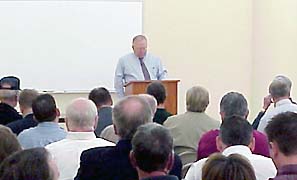
The blank blackboard is representative of what was revealed at a recent meeting of the Tri-State Water Resource Coalition Board after Larry Chappell, spokesperson for Black and Veatch Engineering, took the podium.
Fifty people, including representatives from the offices of Rep. Roy Blunt, Senator Kit Bond, and Sen. Jim Talent, crowded into the basement conference room of Joplin City Hall on February 15, 2006 expecting to hear about the $200,000 water study paid for by the Tri-State Water Resource Coalition Board and the Army Corps of Engineers. They were disappointed.
It was not clear why Larry Chappell, spokesperson for Black and Veatch Engineering of Kansas City that was hired to conduct the study, had little to offer the audience. He did indicate that a draft would be provided to coalition members prior to its release to the public in order to allow the coalition members time to preview the final document and be comfortable with it. The study, he said, wouldn't be made public until the late spring. Those coalition members that were part of the captive audience included representation from Southeast Kansas and Southwest Missouri. No members from Northeast Oklahoma were present.
"When the well runs dry, we know the worth of water"
--Benjamin Frankin from Poor Richard's Almanac
Although Chappell specifically did not address the future of water usage in the region, he did outline some general points, including the suggestion that four area lakes--Grand Lake of the Cherokees, Truman, Stockton and Table Rock--be considered as future water sources for the different sections of the region as the ground water supply becomes limited or contaminated. He indicated that the lakes managed by the Corps would require congressional petitioning for water reallocation while the Grand River Dam Authority would have to be approached separately.
A spokesperson for the Coalition Tech Committee reported that as ordered a Well Data Management System was functional but limited to 20 cities that contribute to or are coalition members. Bob Nichols, coalition president, recommended that the system be open to everyone in the region. While he said that goals such as using water efficiently and wisely should be met, he did admit that there were currently no conservation plans in place in Missouri. Robert Lytle, a representative from the Kansas Division of Water Resources, made it clear that his state was being more responsive to the water issue by already having state mandated municipal water conservation plans in place.
According to a U.S. Drought Monitor dated Thursday, Feb. 16, 2006, conditions in the Four-State area including Missouri, Kansas, Oklahoma and Arkansas due to lack of precipitation have been labeled "extreme." Chuck Brown, attorney for the coalition spoke briefly about the limitation of the coalition in dealing with the magnitude of the water problem involving Missouri and its neighboring states. He called for possible empowering federal legislation.
Check out comments made by activist and former Carthage resident Jean Blackwood in an op ed published in the Joplin Independent on February 19, 2004. And the debate still rants on.....






Comments